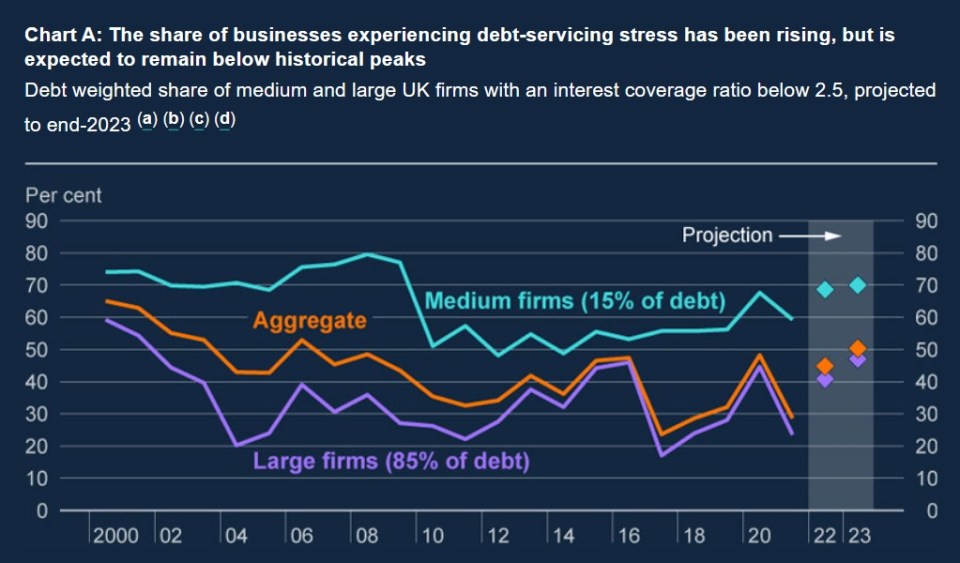Trade bodies warn Bank of England economic data ignores small business fears

The proportion of businesses that will struggle to pay back debts due to rising interest rates could increase to the highest level since the financial crisis, the Bank of England has warned.
In a blog post published today, the central bank said the proportion of firms that are seeing debt-servicing distress is projected to increase from 45 per cent in 2022 to 50 per cent by the end of 2023.
For medium-sized firms, which make up only 15 per cent of the survey, 70 per cent were predicted to face stress, which is up marginally from its present level.
Small business groups complained their needs were not being taken into account.
The Bank’s definition of a company that will face difficulty centred on a firm’s interest coverage ratio (ICR), which divides a companies earnings before tax and interest by their interest expense. Companies with an ICR below 2.5 were put in the ‘difficulty’ bracket.
“Defaults can increase risks to financial stability directly through reducing lender resilience, while sharp reductions in investment and employment can indirectly affect financial stability by amplifying macroeconomic downturns,” the post warned.
Despite the increase, the Bank reassured that the level of debt-servicing stress will remain below the equivalent level during the financial crisis.

It also noted that the analysis does not take into account actions companies could take to reduce the impact of rising rates, such as deleveraging. The Bank said there is some evidence that a certain level of corporate deleveraging is ongoing.
The data was presented to the Financial Policy Committee in the second quarter and helped to shape the decisions of rate-setters. Some business groups raised questions as to whether the Bank was taking the impact of rate hikes on businesses seriously enough.
Martin McTague, national chair of the Federation of Small Businesses (FSB), highlighted that the data does not include many small businesses that are “far more exposed” to rising rates than larger peers.
FSB data from the second quarter of 2023 shows that one fifth of small businesses reported financing as a main contributor to increased costs, the highest proportion on record.
“Small and medium-sized firms make up over 99 per cent of all businesses in the UK, and the risks to them from rising interest rates are far from theoretical,” McTague said.
David Bharier, head of research at the British Chamber of Commerce said the data was consistent with what “thousands of SMEs are telling us”.
“Businesses are citing significant increase to costs from loan repayment, mortgages, and invoice financing…they need to be reassured that the Bank of England fully understands the impact high interest rates are having.”
Despite the pain rising rates are pouring onto businesses, other groups noted that there was still support for rate hikes.
Kitty Ussher, chief economist at the Institute of Directors (IoD), noted that a majority of the IoD’s members were “even more concerned” by high inflation rather than rising rates.
But Ussher also highlighted that monetary policy operates with a lag, raising the question of whether it might be prudent to pause rate rises “so as to avoid the risk of overshooting”.